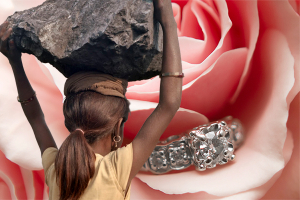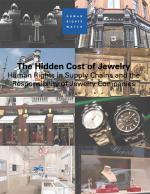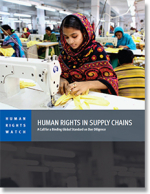Human Rights in Supply Chains
A Call for a Binding Global Standard on Due Diligence - Human Rights in Supply Chains sets out some of the most pervasive human rights problems documented by Human Rights Watch in global supply chains.
In our globalized economy, businesses across all sectors increasingly source all manners of goods and services from complex chains of suppliers that often span multiple countries with radically different legal, regulatory, and human rights practices.
According to the International Labour Organization (ILO), more than 450 million people work in supply chain-related jobs. While complex global supply chains can offer important opportunities for economic and social development, they often present serious human rights risks that many companies have failed to mitigate and respond to effectively.
Individual companies’ global supply chains often involve large numbers of suppliers or subcontractors, including some who are part of the informal sector. The people most affected by human rights abuses in a company’s supply chain often belong to groups who have no realistic opportunities to call attention to these problems themselves, or secure a remedy, such as women workers, migrant workers, child laborers, or residents of rural or poor urban areas.
International norms, such as the United Nations Guiding Principles on Business and Human Rights, recognize that companies should undertake “human rights due diligence” measures to ensure their operations respect human rights and do not contribute to human rights abuses. Human rights due diligence includes steps to assess actual and potential human rights risks, take effective measures to mitigate those risks, and act to end abuses and ensure remedy for any that occur in spite of those efforts. Companies should also be fully transparent about these efforts.
But the UN Guiding Principles on Business and Human Rights and other international norms for companies are not legally binding. Companies can and sometimes do ignore them, or take them up half-heartedly and ineffectively. Many companies have inadequate or no human rights due diligence measures in place, and their actions cause or contribute to human rights abuses. For more than two decades, in every region of the world, Human Rights Watch has documented human rights abuses in the context of global supply chains in agriculture, the garment and footwear industry, mining, construction, and other sectors.
The 2016 International Labour Conference, a global summit of governments, employers, and trade unions on labor issues, presents a unique opportunity to bring about fundamental change. For the first time, the International Labour Conference will focus on decent work in global supply chains. Governments have the primary responsibility to protect human rights, including of people working in global supply chains, but have often failed to oversee or regulate the human rights practices of companies domiciled on their soil. In the absence of legally binding standards, ensuring that all companies take their human rights due diligence responsibilities seriously becomes extremely difficult. Voluntary standards, while valuable, are not enough.
Human Rights Watch urges governments, employers, and trade unions attending the International Labour Conference to seize the opportunity to begin the process for the adoption of a new, international, legally binding standard that obliges governments to require businesses to conduct human rights due diligence in global supply chains.
What’s Related



Favorites





